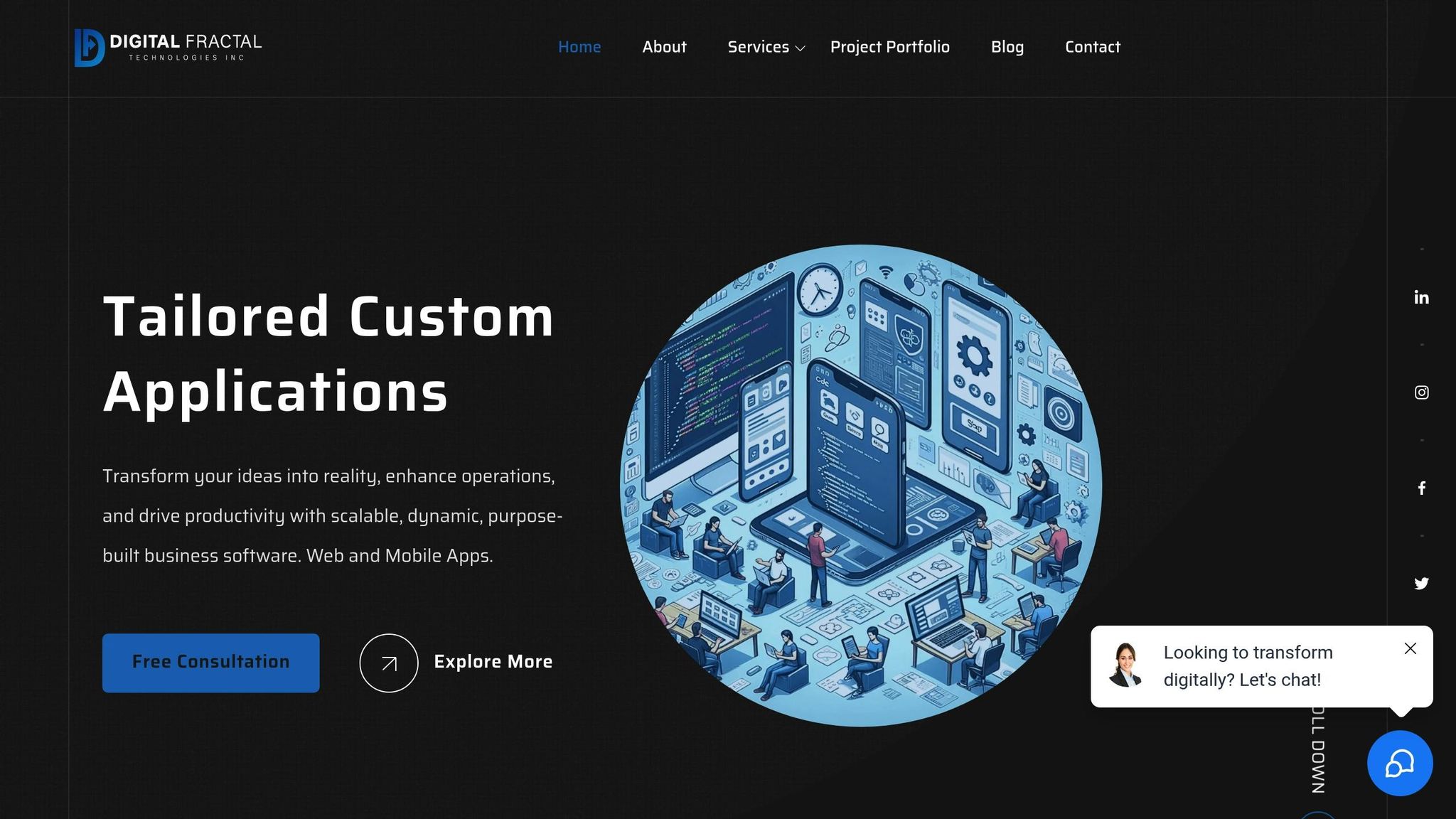
AI in Property Management: Trends for Hospitality | Digital Fractal
AI is transforming Canada’s hospitality industry by improving guest experiences, streamlining operations, and boosting revenue. Here’s how:
- Guest Personalization: AI tools like smart room controls and multilingual chatbots tailor services to individual preferences, cutting response times by 73%.
- Efficiency Gains: Predictive maintenance prevents costly repairs, while smart energy management reduces energy costs by up to 30%.
- Revenue Growth: Dynamic pricing systems adjust room rates based on demand, increasing revenue by 10–20% for smaller properties.
- Sustainability: AI helps reduce energy and resource waste, aligning with eco-conscious guest expectations.
With rising guest expectations and labour shortages, AI adoption is no longer optional. It offers practical solutions for challenges like bilingual communication, privacy compliance, and real-time analytics. Whether you’re managing a boutique hotel in Toronto or a bed-and-breakfast in the Maritimes, AI levels the playing field and supports growth in an increasingly competitive market.
AI Technology Is Revolutionizing Hotels And Hospitality
AI Personalization for Guest Experiences
Today’s guests expect service that’s tailored to their needs, and AI is stepping up to meet those demands across Canadian hospitality. In fact, 42% of travel executives are keen on using AI to improve customer experiences. This growing emphasis on personal service is reshaping the industry, with innovations like smart room controls and advanced communication tools making a noticeable impact.
Currently, around 89% of hotel properties leverage AI for customer service, cutting response times by an impressive 73%. By analysing data from sources like booking preferences, previous stays, and communication history, AI builds detailed guest profiles. This allows hotels to anticipate what guests need, creating a smooth journey from check-in to check-out.
Smart Room Controls and Guest Preference Prediction
Smart room technology is one of the most practical ways AI is changing guest experiences. Using IoT devices and machine learning, these systems automatically adjust room settings to match individual preferences. For instance, returning guests might find their room set to a comfortable 21°C, with lighting and entertainment options reflecting their past choices.
This technology takes a proactive approach, analysing usage patterns to predict and meet guest needs before they even have to ask. Features like voice-controlled lighting and temperature adjustments make it easy for guests to create their ideal environment. Many systems also integrate with mobile apps and voice assistants, allowing guests to tweak settings without needing to contact hotel staff.
AI Communication Tools
AI-powered communication tools are another way Canadian hotels are personalizing service. Chatbots now handle about 80% of routine guest inquiries, letting staff focus on more complex tasks. These bots provide 24/7 support in multiple languages, covering everything from hotel amenities to local attractions and dining options.
Multilingual capabilities are especially important in Canada, where properties cater to diverse populations. Platforms like HiJiffy support over 130 languages, making it easy for guests in cities like Toronto, Vancouver, and Montreal to communicate in their preferred language, whether it’s French, Mandarin, Spanish, or another. These chatbots go beyond simple translations, adapting to cultural nuances and communication styles.
Omnichannel platforms take guest interaction to the next level by unifying messages from apps like WhatsApp, Instagram, and Facebook. Tools such as Asksuite and Chatlyn ensure consistent communication no matter how a guest reaches out. AI also personalizes pre-arrival emails, offering tailored upsells on amenities and boosting revenue per guest.
When issues arise, AI steps in to provide real-time solutions. Messaging platforms powered by AI can categorize problems, suggest fixes, and escalate to human staff if needed. This ensures small problems are resolved quickly, preventing them from escalating into bigger concerns. By combining personalization with operational efficiency, these tools not only enhance guest satisfaction but also support better business outcomes.
Operational Efficiency Through AI Automation
AI is reshaping the hospitality industry, not just by personalizing guest experiences but also by streamlining operations in ways that save money and improve efficiency. By automating tasks, AI helps reduce costs, prevent equipment failures, and simplify daily workflows. It’s no surprise that 85% of real estate decision-makers plan to boost technology spending over the next three years, moving automation from experimental phases into the core of everyday operations across the sector.
This shift is addressing a major challenge: how to run hospitality properties efficiently while maintaining exceptional service. With AI taking over routine tasks, staff can dedicate their efforts to higher-level decision-making and delivering outstanding guest experiences.
Predictive Maintenance for Hospitality Properties
Equipment breakdowns are a hospitality nightmare. They not only ruin guest experiences but also lead to expensive emergency repairs. AI-powered predictive maintenance is changing this by using IoT sensors to monitor equipment performance and flagging potential issues 2–4 weeks before they occur. This proactive approach allows properties to schedule maintenance during quieter periods, avoiding disruptions and costly repairs.
Several AI tools are designed specifically for predictive maintenance in the hospitality space. For example:
- CoolAutomation offers a suite for HVAC predictive maintenance, compatible with all major brands and supported by cloud-based apps and IoT devices.
- nClarity provides real-time performance monitoring and early warning systems tailored for critical facilities.
- SensorFlow delivers a smart energy management solution with wireless sensors that install in just 10 minutes per room and come with a 5-year warranty.
These systems don’t just prevent breakdowns; they extend the lifespan of equipment and protect a property’s reputation. Imagine a guest dealing with a broken air conditioner during a summer stay in Toronto or Vancouver – predictive maintenance can help avoid such situations entirely.
Modern predictive maintenance systems are also easy to integrate. Platforms like Mews offer over 1,000 certified integrations, enabling seamless connections to IoT sensors, access control systems, and operations apps. This integration removes data silos and automates workflows. For example, live climate data can be pulled into an operations dashboard, a guest can be notified of temporary adjustments, and the event can be logged for compliance – all without switching between systems.
But predictive maintenance is just one piece of the puzzle. AI is also transforming energy and resource management.
Smart Energy and Resource Management
Energy costs are one of the biggest expenses for hospitality properties, making AI-powered smart energy management an essential tool for improving efficiency. These systems use IoT sensors and real-time analytics to monitor resource consumption and automatically adjust HVAC, lighting, and water systems based on occupancy and guest preferences. The result? Reduced waste and progress toward sustainability goals.
AI goes far beyond simple scheduling. It analyses factors like occupancy, weather, and guest data to fine-tune energy use. For instance, unoccupied rooms are automatically adjusted, while rooms are pre-conditioned for comfort as guests return.
The installation process is now easier than ever for Canadian properties. Tools like SensorFlow’s wireless sensors can be installed in just 10 minutes per room, with no major infrastructure changes required. This makes it a feasible option even for smaller, independent hotels with limited IT resources.
For these independent properties, AI energy management levels the playing field. It offers scalable, cost-effective solutions that don’t require dedicated IT teams. By automating energy optimisation, smaller properties can achieve the same efficiency gains as larger competitors. On top of that, AI-driven energy management can significantly cut operational costs while lowering carbon footprints and water usage. This dual benefit of cost savings and sustainability resonates strongly with Canadian guests, who increasingly prioritise environmentally responsible travel.
To make the most of these systems, properties should focus on solutions that integrate seamlessly with their current property management platforms. Starting small – with targeted use cases and clear outcomes – can help demonstrate ROI and build support for broader AI adoption.
AI-Driven Revenue Optimisation and Security
AI is reshaping how businesses manage revenue and protect sensitive data, especially in the hospitality sector. By enhancing pricing strategies and strengthening data security, AI not only boosts revenue but also ensures compliance with Canadian regulations. These advancements are critical for maintaining guest trust while adhering to privacy laws.
Dynamic Pricing and Real-Time Analytics
AI-powered dynamic pricing tools are revolutionising revenue management by automatically adjusting room rates based on real-time market conditions. These include factors like demand fluctuations, competitor pricing, local events, and guest behaviour. For Canadian properties, these systems are designed to display prices in CAD and take into account local nuances, such as statutory holidays and seasonal travel trends.
These tools don’t just optimise pricing – they also simplify booking workflows, significantly cutting down manual tasks. For independent hotels, which often lack dedicated revenue managers, AI has become a game-changer. It can save over 30 hours per month while improving revenue performance.
Real-time analytics go hand-in-hand with dynamic pricing, providing detailed dashboards that track occupancy rates, booking patterns, and guest demographics. Presented in local formats (e.g., dates as YYYY-MM-DD), these insights allow managers to respond swiftly to market changes, such as increased demand during major Canadian events or unexpected weather shifts.
AI also tackles the issue of abandoned bookings – a problem affecting 52% of travellers who leave the process midway. Direct booking tools simplify the experience and use targeted offers to encourage completion. Advanced platforms like IDeaS G3 even adjust rates dynamically based on demand elasticity, ensuring properties capture the maximum value from each booking.
This seamless analytical capability extends naturally into robust security measures, ensuring guest data is well-protected.
Fraud Detection and Data Security
With the growing volume of guest data being processed, securing this information is not just a priority but a necessity under Canadian privacy laws. AI systems excel at monitoring transactions and identifying suspicious activities in real time. For example, if multiple bookings are made from different locations using similar payment methods within a short timeframe, the system can flag this for review.
Canada’s PIPEDA (Personal Information Protection and Electronic Documents Act) mandates strict guidelines for handling personal data. AI systems must support data localisation by storing information within Canada when required, offer clear opt-in/opt-out options for guests, and ensure bilingual communication with Canadian spelling conventions.
A Toronto-based hotel showcased the effectiveness of such AI systems. By adopting an AI-powered dynamic pricing platform with integrated fraud detection, the property achieved a 15% increase in RevPAR and a 40% reduction in chargeback incidents within six months. The system was fully compliant with PIPEDA, processing transactions in CAD and using local date/time formats.
Modern AI security solutions integrate effortlessly with property management systems, automating compliance checks, enforcing encryption standards, and generating detailed audit trails. These features simplify regulatory monitoring while ensuring guest data remains secure.
By combining revenue optimisation with robust security, AI creates a solid operational foundation. Canadian properties can benefit from scalable platforms that integrate real-time analytics, automated pricing, and advanced security measures.
Digital Fractal Technologies Inc offers customised AI solutions for Canadian hospitality businesses, including dynamic pricing tools, fraud detection systems, and secure CRM integrations – all designed to meet local privacy standards.
sbb-itb-fd1fcab
Environmental Benefits Through AI and Green Technology
In Canada, hospitality businesses are under increasing pressure to comply with environmental regulations while meeting the demands of eco-conscious guests. These travellers expect hotels to operate responsibly, and AI is stepping in to help. By reducing energy use, cutting waste, and improving operational efficiency, AI not only supports sustainability efforts but also gives businesses a competitive edge in a market that values environmental responsibility.
The environmental advantages of AI extend beyond operational savings. Hotels using AI-powered solutions have reported significant reductions in energy consumption, all while enhancing guest comfort. This makes AI an essential tool for businesses aiming to balance profitability with environmental stewardship.
AI for Energy Efficiency and Waste Reduction
One of the most impactful uses of AI in hospitality is in smart energy management. These systems use wireless sensors and machine learning to monitor and adjust heating, cooling, and lighting based on real-time occupancy and weather data. For example, SensorFlow offers a system that can be installed in just 10 minutes per room and comes with a 5-year warranty. Their technology has been shown to significantly cut energy usage.
In 2024, SensorFlow partnered with several hotel chains in Southeast Asia to roll out its AI-driven energy management system. Over a year, these hotels achieved an average 30% reduction in energy consumption for HVAC systems. The system featured real-time monitoring, automated room controls, and predictive maintenance alerts, with results verified by independent energy auditors.
Closer to home, a Toronto hotel implemented an AI-powered HVAC system and predictive maintenance tools, reducing energy costs by 25% while improving guest comfort. The system adjusted room temperatures automatically based on occupancy and weather, and it scheduled maintenance during low-occupancy periods to avoid waste and disruptions.
AI systems also optimise energy use by scheduling energy-intensive tasks during off-peak hours, easing strain on the electrical grid. Beyond energy, AI contributes to waste reduction in areas like inventory and food service. For instance, AI-driven inventory systems predict demand for food and supplies, cutting down on over-ordering and spoilage. Hotels have also used AI to optimise buffet quantities, reducing food waste by up to 20%. Waste tracking platforms that use image recognition can analyse discarded items and suggest process improvements, creating a cycle of continuous efficiency gains.
Predictive maintenance powered by AI extends the lifespan of equipment and prevents waste from premature replacements. By analysing performance patterns and anticipating potential failures, hotels can avoid costly emergency repairs and keep equipment running efficiently throughout its lifespan.
Modern AI solutions integrate easily with existing property management systems through open APIs and plug-and-play setups. Platforms like Mews offer hundreds of certified integrations, allowing hotels to connect IoT sensors, climate controls, and waste tracking tools directly to their operational dashboards. This seamless integration ensures that environmental data is automatically captured and reported, simplifying compliance with Canadian regulations.
AI also automates the tracking and reporting of energy use, waste generation, and water consumption, helping properties meet Canadian standards such as provincial energy efficiency mandates and federal greenhouse gas reporting requirements. These tools generate detailed reports in local formats, using Canadian measurements like kilowatt-hours, litres, and metric tonnes, and provide transparent, real-time data for audits.
Meeting guest expectations is another major benefit. Today’s travellers want to see tangible sustainability efforts, and AI makes it possible. Features like smart thermostats, automated lighting, and real-time energy usage displays not only enhance a property’s reputation but also improve guest satisfaction.
Experts recommend a phased approach to adopting AI in hospitality. Starting with low-risk, high-impact workflows is key, as is ensuring that systems are interoperable and prioritising privacy and data security. The focus should be on solutions that deliver actionable insights and measurable results, rather than adopting technology for its novelty.
Companies like Digital Fractal Technologies Inc offer tailored AI solutions for the Canadian hospitality sector. Their expertise in workflow automation and smart energy management helps properties comply with local regulations, improve efficiency, and achieve their sustainability goals.
How Digital Fractal Technologies Inc Supports AI Transformation

For Canadian hospitality businesses, having a partner who understands both AI and the local market is essential. Based in Alberta, Digital Fractal Technologies Inc specializes in custom software development and AI consulting, offering tailored solutions that align with the operational and revenue opportunities AI brings to the hospitality sector. Their expertise helps properties adapt to digital trends while addressing unique industry needs.
Instead of generic, one-size-fits-all tools, they create custom AI applications designed to tackle specific operational challenges and enhance guest experiences. Their team collaborates closely with clients to evaluate existing systems and integrate AI solutions that work seamlessly with current property management platforms. Their consulting services cover areas like machine learning, computer vision, and workflow automation, improving everything from guest communication to maintenance scheduling. Examples include smart room controls, predictive maintenance tools, and dynamic pricing engines – all designed to meet Canadian regulations and data privacy standards.
What sets Digital Fractal Technologies Inc apart is their experience across industries such as the public sector, energy, and construction. This broad expertise helps them address challenges common to multiple sectors, like resource optimization, predictive maintenance, and automated reporting. Their ability to develop scalable, purpose-built applications translates directly to solving the unique needs of hospitality management, enhancing both efficiency and service quality.
Their API-driven approach ensures that new AI modules integrate smoothly with existing systems, supporting bilingual interfaces, Canadian data formats, and minimal workflow disruption. This integration reduces the need for manual data entry, making AI-generated insights readily usable within current technology setups.
Data security is a top priority for Digital Fractal Technologies Inc. They ensure their solutions comply with PIPEDA through strong encryption and privacy-by-design principles, safeguarding sensitive guest and operational data. Regular updates keep their systems aligned with evolving legal standards and best practices, a critical factor for hospitality businesses handling private customer information.
Their process begins with a detailed needs assessment, followed by solution design, prototyping, and phased deployment. This step-by-step approach allows properties to test AI in specific areas, like guest communication or maintenance management, before expanding to broader applications. To ensure success, they provide ongoing support, training, and system optimization, enabling smooth integration and measurable results.
AI-powered automation can cut operational costs by up to 30% while significantly improving guest satisfaction. Digital Fractal Technologies Inc helps clients track progress throughout their AI transformation journey. Their experts emphasize measurable outcomes, staff training, effective change management, and continuous feedback to maximize adoption and long-term impact.
These services highlight how local expertise can drive AI adoption in the hospitality industry. For Canadian properties looking to embrace AI, Digital Fractal Technologies Inc delivers the technical know-how, local insight, and regulatory compliance needed to achieve meaningful operational improvements and elevate guest experiences.
Conclusion: The Future of AI in Hospitality Property Management
AI is reshaping the hospitality industry across Canada, bringing a wave of automation that’s transforming operations and elevating guest experiences. For properties looking to stay competitive, embracing AI is quickly becoming a necessity.
Guest experiences are becoming more personalized thanks to tools like smart room controls and multilingual chatbots. These technologies allow hotels to tailor services to the diverse needs of guests across Canada, creating a more welcoming and seamless stay.
On the operational side, efficiency is reaching new heights. Predictive maintenance tools help avoid expensive repairs and disruptions, while smart energy management systems adjust heating, cooling, and lighting based on occupancy and weather. In a country with such varying climates, this kind of adaptability isn’t just convenient – it’s cost-effective. These advances don’t just save money; they also align with sustainability goals, helping properties reduce waste and operate more responsibly.
AI also opens doors to smarter revenue management. Dynamic pricing systems and real-time analytics give even smaller, independent hotels the tools to compete with larger enterprises. By optimizing pricing strategies and resource use, properties can boost revenue while maintaining high standards of service.
Success in this space, however, depends on selecting solutions tailored to each property’s unique needs. Whether it’s complying with privacy laws like PIPEDA or adapting to local market demands, AI tools that integrate smoothly with existing systems are key. By addressing these factors, Canadian properties can make the most of AI without disrupting their operations.
Looking ahead, AI promises even more seamless operations and hyper-personalized guest interactions. This levelling of the playing field will allow properties of all sizes to compete on equal footing.
Taking a strategic, step-by-step approach to AI adoption – starting with areas like guest communication, maintenance, or energy management – can help build confidence and expertise. With the right guidance and carefully chosen tools, Canadian hospitality properties are well-positioned for sustainable growth and long-term success in this evolving landscape.
FAQs
How does AI help hospitality properties save money and promote sustainability?
AI is transforming how hospitality properties manage costs and adopt environmentally friendly practices. With AI-powered tools, properties can fine-tune energy use through smart systems that automatically adjust lighting, heating, and cooling based on factors like room occupancy and weather. This not only lowers energy bills but also reduces their environmental footprint.
Beyond energy management, AI streamlines operations by automating routine tasks such as booking management, inventory tracking, and maintenance scheduling. This helps cut down on labour expenses while ensuring resources are allocated efficiently. Over time, these advancements lead to noticeable cost savings and more eco-conscious operations.
How does AI enhance guest personalization in Canadian hotels?
AI is reshaping how Canadian hotels deliver personalized experiences by diving deep into data to understand what guests truly want. By analysing patterns in preferences and behaviours, hotels can offer tailored suggestions – whether that’s adjusting room settings to match personal tastes, recommending dining options, or suggesting activities that align with a guest’s interests. These thoughtful touches help create a stay that’s not just comfortable but genuinely memorable.
On top of that, AI-powered tools like chatbots make it easier to provide quick answers to guest questions, while automated systems streamline processes like check-ins and check-outs. This not only makes life easier for guests but also frees up hotel staff to focus on what they do best: delivering outstanding service with a personal touch.
How can smaller hospitality businesses use AI to improve revenue management and compete with larger companies?
Smaller hospitality businesses have a powerful ally in AI-driven tools, which can help them fine-tune their revenue management strategies and remain competitive in a crowded market. With AI, these businesses can analyse booking trends, seasonal fluctuations, and customer behaviours to adjust pricing in real time. This ensures they strike the perfect balance – maximizing revenue while still offering rates that attract guests.
AI also opens the door to personalized marketing by uncovering guest preferences and creating targeted promotions for specific audiences. On top of that, automating repetitive tasks like inventory management or guest communication enables smaller properties to run more efficiently. This efficiency allows them to focus on delivering excellent service, even without the resources of larger competitors.

